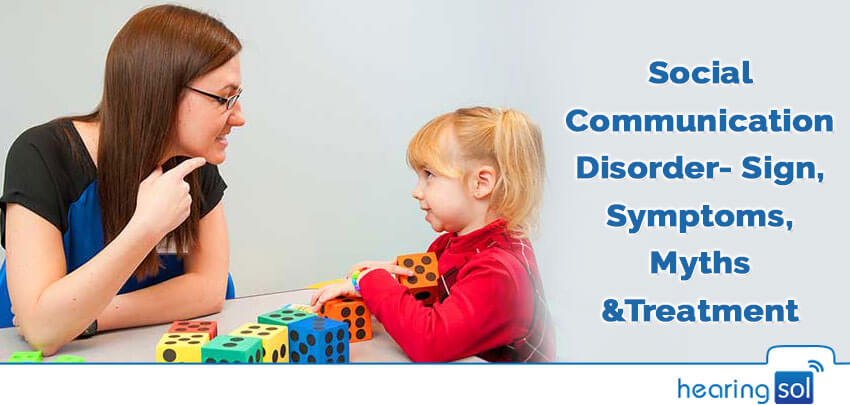
The skills that we use to communicate and interact with each other verbally, non-verbally including gestures, body language, and our personal appearance are called social communication skills.
Communication Skills is the most important part of everyone’s life as we meet many people in our day-to-day life. Our communication skills display our confidence, manners, and involvement in the conversation.
If you need any assistance or have a question about Social Communication Disorder, you can consult our HearingSol experts with your problem, feel free to call us on +91-9327901950. We are always here to help you.
- Good Communication Skills
- Social Communication Disorder
- Types Of Social Communication Disorder In Children
- Causes of Communication Disorders
- Signs/Symptoms of Social Communication Disorder
- Effects of Social Communication Disorder
- How to Treat Social Communication Disorder?
- How to Support a Child at Home?
- Common Myths Related to Social Communication Disorder
- Social Communication Disorder vs Autism
If you lack this skill, it is been called Social Communication Disorder. Not only the lack of communication skill but there are many other factors which lead to a communication disorder.
Find out what are the major causes and effects of the disorder and how to support your child to deal with Social Communication Disorder.

Good Communication Skills
As our communication skills display our personality in front of people, it should be pleasing to others. The good communication skills include-
- Active listening
- Good manners
- Gestures and eye contact
- Thinking before you speak
- Listening with understanding
- Speaking clearly and not shouting
- Having a sense of humor
Social Communication Disorder
The inability to communicate and put your opinions and views in words is called Social Communication Disorder or Pragmatic Communication Disorder.
A social communication disorder can result in many problems, including difficulty participating in social settings, achieving academic success, developing peer relationships, and performing successfully on the job.
Why Are Social Communication Skills Important?
1. Better Communication
Being able to convey one’s thoughts and ideas is the most important skill for communication. If you are able to express what you think then another person also takes interest in your conversation.
This helps in better interaction between two people.
2. Better Relationships
Good communication skills can increase your happiness and satisfaction and give you a better outlook on life. By developing your communication skills, you become fascinating.
And people are more interested in a charming personality. And as a result, you develop strong interpersonal relationships with people. Focusing on relationships will help you make new friends, get a job, and get promoted.
3. Career Prospects Advancements
Most organizations look for those individuals who have the ability to work well in a team and influencing and motivating people to get things done.
So, developing a pleasing personality with great communication skills will help you to take the graph of your career growth higher.
4. Increases Overall Happiness
A simple smile and ‘Hello’ will lead to a new friendship being formed. If you are able to make yourself understood and also understand what others are trying to express, you open many personal and career-related doors.
Types Of Social Communication Disorder In Children
1. Childhood Apraxia of Speech (CAS)
A child with CAS knows what she wants to say but the messages do not get through the muscles correctly. Even though her muscles are not weak, your child might not be able to move his lips or tongue to the right place to say sounds.
2. Dysarthria
It is a motor speech disorder. It can be mild or severe. We use many muscles to talk like muscles in our face, lips, tongue, and throat, as well as muscles for breathing.
If any of these muscles are weak, it’s hard to talk. Dysarthria occurs when you have weak muscles due to brain damage, stroke, or tumor.
3. Orofacial Myofunctional Disorders
When you are not talking or eating, your tongue usually stays in your mouth. So, to make some sounds or eat some foods, you may stick your tongue out a little.
With OMD, your tongue moves forward too much and may rest on your lips or stick out too far when you talk or eat.
4. Speech Sound Disorders
Most of the children learn to talk by their expected age. Those children who do not say sounds by the expected age may have a speech sound disorder.
5. Stuttering
Sometimes we are not able to speak smoothly and may say a sound or word more than once. If these disfluencies occur every once in a while, it is normal. But if it happens a lot, it may be stuttering.
6. Voice Disorders
You may have problems with your voice at some time. Maybe you had lost your voice due to cold. Maybe you cheered too much and loudly for your favorite team and had a hoarse voice for a few days after.
Some voice problems last for a short time while others may take a longer time to recover. These are called voice disorders.
Causes of Communication Disorders
- Biological problems such as abnormalities of brain development.
- Exposure to toxins during pregnancy like abused substances or environmental toxins such as lead.
- Genetic factor
- Hearing Loss
- Autism
- Brain injury
- Neurological disorder
- Developmental disorder
- Stroke
Signs/Symptoms of Social Communication Disorder
Signs of Social communication disorder depends upon the individual’s age, his or her stage of development, and communication context. Symptoms of social communication difficulty include-
- Difficulty in interacting with family, friends other people around them.
- Reduced eye contact.
- Non-meaningful or irrelevant speech
- Difficulty in following instructions.
- Poor understanding of emotions.
- Literal and poor understanding of sarcasm.
- Delayed development of speech.
- Difficulty in using and reading facial expressions.
- Using appropriate verbal and nonverbal signals to regulate interaction.
Effects of Social Communication Disorder
- Social Isolation
- A poor parent or peer relationship
- High levels of frustration and anxiety.
- Reduced literacy skills; including reading, writing, and comprehension.
- Emotionally volatile
- May cause a child to fall behind academically and become disinterested in learning.
How to Treat Social Communication Disorder?
The treatment for Social Communication disorder needs the support of family, friends, teachers, therapists. If the people around the affected individual help him in improving, this will help in an increased rate of improvement in the individual.
Possible treatments include:
1. Therapies by Specialists
Professional therapists- Speech-Language Pathologist specializing in SCD (social communication disorder) can do wonders for your child. They provide speech therapy to the child. This therapy can take place anywhere in school, center, or at home.
2. Education & tools used by teachers, coaches, and other elders
The child will gain more support if teachers, coaches, and friends and family members possess the information and tools with which they can engage your child more fully.
3. Involvement of Family
The therapist will train the whole family with techniques, strategies, games, tools, etc., to help you communicate with your child. This practice helps in your child’s interactions with other social groups and communities, too.
4. Practice
Help your child to practice in real-life. Provide him with any communication partner. You can help your child in the by applying these methods-
- Conversations and gentle reminders.
- Using stories to discuss the facial expression
- Talk and ask about the feelings and body language in particular situations.
How to Support a Child at Home?

Work closely with the therapist and learn the skills during sessions and apply them when you are at home.
You can learn beneficial skills that will help you to support your child at home.
Several therapeutic activities you can learn include-
- Talk about feelings. Use stories, books, etc to explore a character’s feelings and emotions.
- Read and discuss a book, and ask questions from the story like-” Who was your favorite character in the story?” Or “Which part of the story was the most exciting and thrilling for him?”.
- Use visual supports for your child like charts, daily schedule, activities, etc., which is a benefit for kids with SCD who process information visually.
- Predict the next action in a story and give clues to your child so that he thinks about the conclusion.
Common Myths Related to Social Communication Disorder
1. Children with SCD are not intelligent.
Social communication disorder does not typically mean that IQ will below. Many individuals with SCD are smart, social, and successful in their life.
2. A social communication disorder is a symptom of autism
Children with autism may have social communication issues, but they may also have additional symptoms. Children with social communication disorders are not necessarily on the autism spectrum.
3. Social communication disorder occurs on its own
SCD can occur on its own, but it can also coexist with speech disorders, ADHD, and other learning disabilities.
4. SCD only affects speech.
A social communication disorder can affect all types of verbal and nonverbal communication, including spoken, written, gesture, and sign language.
Social Communication Disorder vs Autism
SCD is one of the effects of Autism. But it can be caused due to many other reasons as we have studied above.
Children with either ASD or SCD often have a corresponding Developmental Language Disorder, which needs to be considered during the diagnosis and treatment process.
Both ASD and SCD involve difficulty in communication skills. But the main difference between them is the additional characteristic of SCD- repetitive behavior. Hence, while evaluating SCD, ASD is ruled out.
The approach to treatment can be similar for both SCD and ASD. It is important to teach the family members, peers how to initiate and maintain interaction with children who have social communication difficulties.
This provides an opportunity to understand the strengths of friends with ASD and SCD and further help them. And they can appreciate and motivate their friend. To know more differences between SCD and ASD, visit this link.
Professional support is essential

You can’t expect your child to pick up the communication skills just by spending time with other children.
Without professional intervention, if you place your child in a social environment, it can do more harm than good by leading to teasing and isolation.
At the same time, if you take proper support and then encourage your child in participating in social activities, it can be a wonderful learning experience.
A therapist well-trained in social communication intervention can provide your child and you with the strategies which will be beneficial for the child.
If you need any assistance or have a question about Social Communication Disorder, you can consult our HearingSol experts with your problem, feel free to call us on +91-9327901950. We are always here to help you.

 Reviewed by Mr. Ranjeet Kumar
Sr. Audiologist, Speech Therapist & Cochlear Implant Specialist, BASLP on
Reviewed by Mr. Ranjeet Kumar
Sr. Audiologist, Speech Therapist & Cochlear Implant Specialist, BASLP on